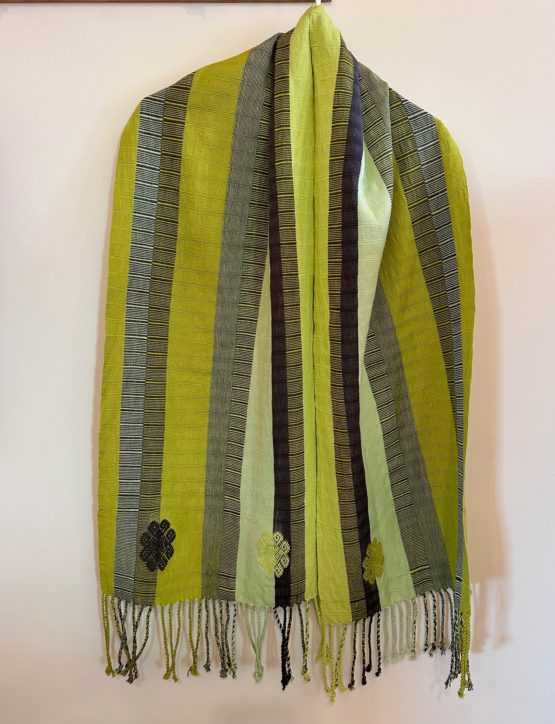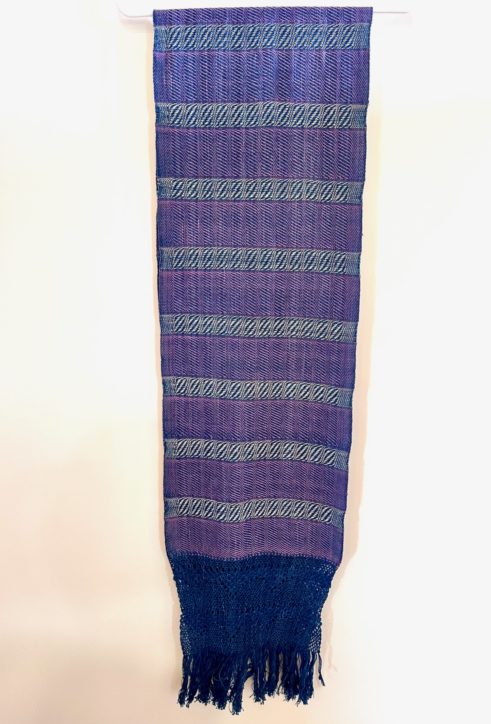Arrive on Saturday, January 11 and depart on Sunday, January 19, 2025 — 8 nights, 9 days in textile heaven!
This tour will not be offered in 2026!
We go deep, and not wide. We give you an intimate, connecting experience. We spend time to know the culture. You will meet artisans in their homes and workshops, enjoy local cuisine, dip your hands in an indigo dye-bath, and travel to remote villages you may never get to on your own. This study tour focuses on revival of ancient textile techniques and Oaxaca’s vast weaving culture that encompasses the use of natural dyes, back-strap loom weaving, drop spindle hand spinning, and glorious, pre-Hispanic native cotton in warm brown called coyuchi, verde (green) and creamy white. We cover vast distances going north on MEX 200 along the Costa Chica, traveling to secluded mountain villages. This tour is for the most adventurous, hardy textile travelers!



At Oaxaca Cultural Navigator, we aim to give you an unparalleled and in-depth travel experience to participate and delve deeply into indigenous culture, folk art and celebrations. To register, please complete the Registration Form and email it to us. When you tell us you are ready to register, we will send you a request to make your reservation deposit.
Cost is $3,895 per person shared room or $4,795 per person for private room. See details and itinerary below.
Please complete this Registration Form and return to Norma Schafer to participate. Thank you.



Jennie Henderson says …
My husband and I just finished this years tour it was fantastic. This trip is an incredible once in a life time opportunity to go where the tourists never go and learn about native cotton being grown, spun and woven. A real highlight of the trip is dinner on the beach with the turtle release and a swim in the bioluminescence lagoon. This trip is a true weavers delight.
This entire study tour is focused on exploring the textiles of Oaxaca’s Costa Chica. You arrive to and leave from Puerto Escondido (PXM), connecting through Mexico City or Oaxaca. You might like to read about on the Oaxaca coast, it’s about the cloth, not the cut.



Villages along the coast and neighboring mountains were able to preserve their traditional weaving culture because of their isolation. The Spanish could not get into those villages until the late 18th century. Much now is the same as it was then. Stunning cotton is spun and woven into lengths of cloth connected with intricate needlework to form amazing garments. Beauty and poverty are twin sisters here.



What we do:
- We visit 7 weaving villages in Oaxaca and Guerrero
- We meet back-strap loom weavers, natural dyers, spinners
- We see, touch, smell native Oaxaca cotton — brown, green, natural
- We participate in a sea turtle release with sunset dinner on the beach
- We swim in a rare bioluminescence lagoon
- We visit three local markets to experience daily life
- We travel to remote regions to discover amazing cloth
- We learn about Afro-Mestizo identity on the Pacific Coast
- We support indigenous artisans directly
- We escape from El Norte WINTER

Take this study tour to learn about:
- the culture, history, and identity of cloth
- beating and spinning cotton, and weaving with natural dyes
- native seed preservation and cultivation
- clothing design and construction, fashion adaptations
- symbols and meaning of regional textile designs
- choice of colors and fibers that show each woman’s aesthetic while keeping with a particular village traje or costume
- the work of women in pre-Hispanic Mexico and today



PRELIMINARY ITINERARY
- Saturday, January 11: Fly to Puerto Escondido—overnight in Puerto Escondido, Group Welcome Dinner at 6:00 p.m. Meals included: Dinner
- Sunday, January 12: Puerto Escondido market meander (optional). Lunch and afternoon on your own. Late afternoon departure for turtle release and Manialtepec bioluminescence lagoon with beach dinner. Overnight in Puerto Escondido. Meals included: Breakfast and dinner
- Monday, January 13: Depart after breakfast for Tututepec to visit a young Mixtec weaver who is reviving his village’s textile traditions, visit local museum and murals. We will enjoy a home-cooked meal with a regional mole dish prepared by the family. Travel by van several hours north to Ometepec, Guerrero. Overnight in Ometepec. Meals included: Breakfast and lunch.
- Tuesday, January 14: After breakfast, we go to Zacoalpan, a bygone Amusgo village where Jesus Ignacio and his family weave native coyuchi, green and natural white cotton to make traditional huipiles. They are rescuing designs from fragments of ancient cloth. Then, we have lunch in nearby Xochistlahuaca with an outstanding weaving cooperative that creates glorious, diaphanous textiles embellished with a palette of colorful designs reflecting the flora of the region. Overnight in Ometepec.

- Wednesday, January 15: After breakfast, we visit downtown Ometepec and the regional market, then make a stop at the Afro-Mexican Museum to learn about the rich cultural history and traditions of the region populated by Mexicans whose roots are from Africa and the slave trade. We continue to Pinotepa Nacional for a late lunch and to check into our hotel. Enjoy an expoventa and demonstration with embroiderers. Overnight in Pinotepa Nacional. Meals included: Breakfast and lunch.
- Thursday, January 16: After breakfast, we explore the Pinotepa Nacional market, the largest in the region, where you may find hand-woven agave fiber tote bags, masks, textiles, and embroidered collars, as well as household goods and food. Then, we travel about an hour to the weaving village of San Juan Colorado for a home cooked lunch and visit two women’s cooperatives working in natural dyes, hand-spinning, and back strap loom weaving. Overnight in Pinotepa Nacional. Meals included: Breakfast and lunch.
- Friday, January 17: After breakfast, we travel back up the mountain to the village of Pinotepa de Don Luis to meet noted weavers who work with naturally dyed cotton. Here, we will see jicara gourd carvers, too, who make jewelry and serving containers. We have lunch with Tixinda Cooperative members who are licensed to harvest the purple snail dye. In this village, the almost extinct caracol purpura snail is the traditional color accent for many textiles. Overnight in Pinotepa Nacional. Meals included: Breakfast and lunch.



- Saturday, January 18: After breakfast, we begin our return to Puerto Escondido, a two-and-a-half-hour van ride. The rest of the day is on your own to explore, relax and pack. Lunch is on your own. We meet at 6 p.m. for our Grand Finale Dinner. Overnight in Puerto Escondido. Meals included: Breakfast and dinner.
- Sunday, January 19: Depart for home. Meals included: None.
Note: You can add days on to the tour — arrive early or stay later to enjoy the beach and two swimming pools — at your own expense. We also suggest you arrive a day early (your own hotel expense) to avoid any unforeseen winter flight delays.






Cost to Participate
- $3,895 shared double room with private bath (sleeps 2)
- $4,795 for a single supplement (private room and bath, sleeps 1)
Your Oaxaca Cultural Navigator: Eric Chavez Santiago

Eric Chavez Santiago is the Oaxaca Cultural Navigator partner with Norma Schafer. He joined us in 2022. Eric is an expert in Oaxaca and Mexican textiles and folk art with a special interest in artisan development and promotion. He is a weaver and natural dyer by training and a fourth-generation member of a distinguished weaving family, the Fe y Lola textile group. He and his wife Elsa Sanchez Diaz started Taller Teñido a Mano dye studio where they produce naturally dyed yarn skeins and textiles for worldwide distribution. He is trilingual, speaking Zapotec, Spanish and English and is a native of Teotitlan del Valle. He is a graduate of Anahuac University, founder of the Museo Textil de Oaxaca education department, and former managing director of the Harp Helu Foundation folk-art gallery Andares del Arte Popular. He has intimate knowledge of local traditions, culture, and community and personally knows all the artisans we visit on this tour.
Oaxaca Cultural Navigator Founder Norma Schafer may participate in all or part of this tour.



We have invited a noted cultural anthropologist to travel with us. She did her thesis in a nearby textile village and has worked in the region for the past 15 years. She knows the textile culture and people intimately, too. Together, we learn about and discuss motifs, lifestyle, endangered species, quality, and value of direct support.
We sell out each year so don’t hesitate to make your registration deposit ASAP if you are interested in participating.




Some Vocabulary and Terms




Who Should Attend
- Explorers of indigenous cloth, native fibers
- Collectors, curators, and cultural appreciators
- Textile and fashion designers
- Retailers, wholesalers, buyers
- Weavers, embroiderers, dyers, and sewists
- Photographers and artists who want inspiration
- Anyone who loves cloth, culture, and collaboration




Full Registration Policies, Procedures and Cancellations– Please READ
Reservations and Cancellations. A $750 non-refundable deposit is required to guarantee your place. The balance is due in two equal payments. The second payment of 50% of the balance is due on or before July 1, 2024. The third payment, 50% balance, is due on or before November 1, 2024. We accept payment using a Zelle transfer (no service fee), or with a credit card (4% service fee). For the credit card payment, we will send you a Square invoice. Tell us when you are ready to register.
After November 1, 2024, there are no refunds. If you cancel on or before November 1, 2024, we will refund 50% of your deposit received to date (less the $750 non-refundable deposit). After that, there are no refunds UNLESS we cancel for any reason. If we cancel, you will receive a full 100% refund.*




Required–Travel Health/Accident Insurance: We require that you carry international accident/health insurance that includes $50,000+ of emergency medical evacuation insurance. Check out Forbes Magazine for best travel insurance options. https://www.forbes.com/advisor/travel-insurance/best-travel-insurance/
Proof of insurance must be sent at least 45 days before departure.



About COVID. Covid is still with us and new variants continue to arise. We request proof of latest COVID-19 vaccination and all boosters to be sent 45 days before departure. We ask that you bring two test kits with you and several N-95 or KN-95 face masks. Face masks are strongly suggested for van travel, densely populated market visits, and artisan visits that are held indoors. We ask this to keep all travelers safe, and to protect indigenous populations who are at higher risk. If you get sick, we will ask you to withdraw from the tour.
Be certain your passport has at least six months on it before it expires from the date you enter Mexico! It’s a Mexico requirement.
















































